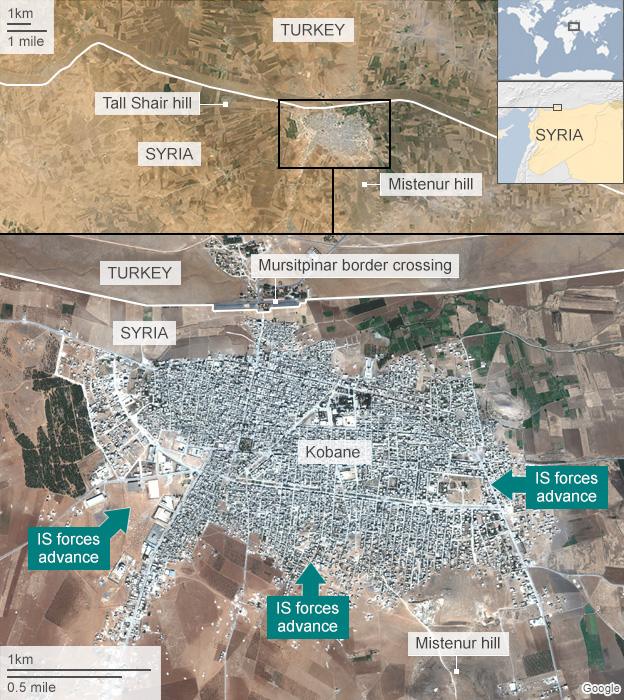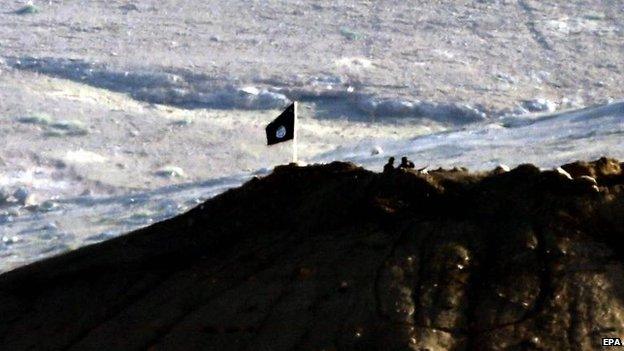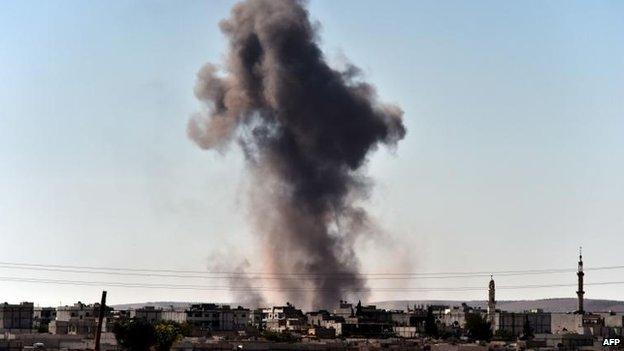Kobane: Islamic State widens attack on border town
- Published
Paul Adams on the Turkey-Syria border near Kobane: "This was a day of colossal explosions"
Fighting continues to rage in the Syria-Turkey border town of Kobane, with Islamic State (IS) militants moving into a southern district.
The US-led coalition has carried out more air strikes to try to aid the Syrian Kurd defenders.
However, Turkish President Recep Tayyip Erdogan warned air strikes were not enough and Kobane was "about to fall".
At least 400 people have died in three weeks of fighting for Kobane, monitors say, and 160,000 Syrians have fled.
If IS captures Kobane, its jihadists will control a long stretch of the Syrian-Turkish border.
Separately, a Kurdish demonstrator has been killed in clashes with Turkish police in the town of Varto, news agencies say, as Kurds widen their protests against what they view as Turkey's inaction over Kobane.
Fresh air strikes
In the latest clashes, the UK-based monitoring group, the Syrian Observatory for Human Rights, said IS had crossed into a southern district of Kobane, taking over many buildings.
However, the Observatory said heavy fighting had forced IS to pull back from the eastern districts its fighters had entered on Monday evening. It also suggested many IS fighters had been killed in an ambush by Syrian Kurdish fighters.


The view of an IS flag from the Turkish side of the border near Kobane

If IS captures Kobane, its jihadists will control a long stretch of the Syrian-Turkish border
The town is now besieged on three sides. A humanitarian mission to evacuate the few thousand civilians left in Kobane continued on Tuesday.
A Kurdish official in Kobane, Idriss Nassan, told AFP news agency there were "lots of clashes" on Monday night and Kurdish fighters had halted the IS advance in the east.
But IS was "trying hard to capture the city", he said.
Mr Nassan also repeated the Syrian Kurds' appeal for the West to supply weapons, and called for coalition aircraft to "strike more effectively". He said the Kurds had not yet received "any suitable answer".

Analysis: Paul Adams, BBC News, near the Syrian border
Turkey, a regional superpower with significant troops and armour in the area, seems extremely reluctant to intervene despite a government pledge to do whatever it takes to prevent the Kurdish town of Kobane from falling.
It wants the US-led coalition to agree on a number of things first, including setting up a no-fly zone and a buffer zone in northern Syria and, crucially, a renewed focus on getting rid of President Assad - which remains Turkey's principal objective.
Add to that the very bad blood that has existed for decades between Turkey and its own Kurdish population.
Turkey fought a bloody war against the Turkish guerrilla group, the PKK, that helps to explain why Ankara remains deeply reluctant to get engaged.

'Ground operation'
The US military said the coalition had carried out five air strikes around Kobane on Monday and Tuesday, destroying four IS armed vehicles and an "IS unit", and damaging one IS tank.
But Mr Erdogan said on a visit to a refugee camp for Syrians: "The problem of [IS] cannot be solved via air bombardment. Right now, Kobane is about to fall.
"We had warned the West. We wanted three things: no-fly zone, a secure zone parallel to that, and the training of moderate Syrian rebels," he said.
About 100 Kurdish protesters broke into the European Parliament
Mr Erdogan said that "the terror will not be over... unless we co-operate for a ground operation", although he gave no further details.
French Foreign Minister Laurent Fabius said he was discussing with Turkey how to stop IS in Kobane: "A tragedy is unfolding, and we must all react. For Kobane, we are mobilising."
Last week, Turkey pledged to prevent Kobane from falling and its parliament authorised military operations against militants in Iraq and Syria.
Although it has a sizeable military force on the Syria border, Turkey has not intervened to defend Kobane.
Kurdish protests have been widening, targeting a number of Turkish cities.
Several dozen Kurdish protesters also burst into the European Parliament in Brussels.
In other developments on Tuesday:
A priest, Father Hanna Jallouf, and some 20 parishioners have been kidnapped from the Syrian village of Knayeh near the border with Turkey by fighters of the Nusra Front, the Latin Patriarchate of Jerusalem said
In addition to the US-led air strikes around Kobane, three other coalition air attacks were carried out in Syria and four in Iraq over Monday and Tuesday, the US said; Dutch F-16s took part in their first air strikes on IS in Iraq
KOBANE KEY FACTS:
Kobane, known in Arabic as Ayn al-Arab, and the villages surrounding it were home to about 400,000 people, most of them Kurds
Kurdish parties have governed the area since the Syrian army withdrew two years ago
In the first half of 2014, IS seized control of neighbouring areas, leaving Kobane surrounded on three sides
IS launched a major offensive on 16 September, prompting more than 100,000 people to flee to Turkey

